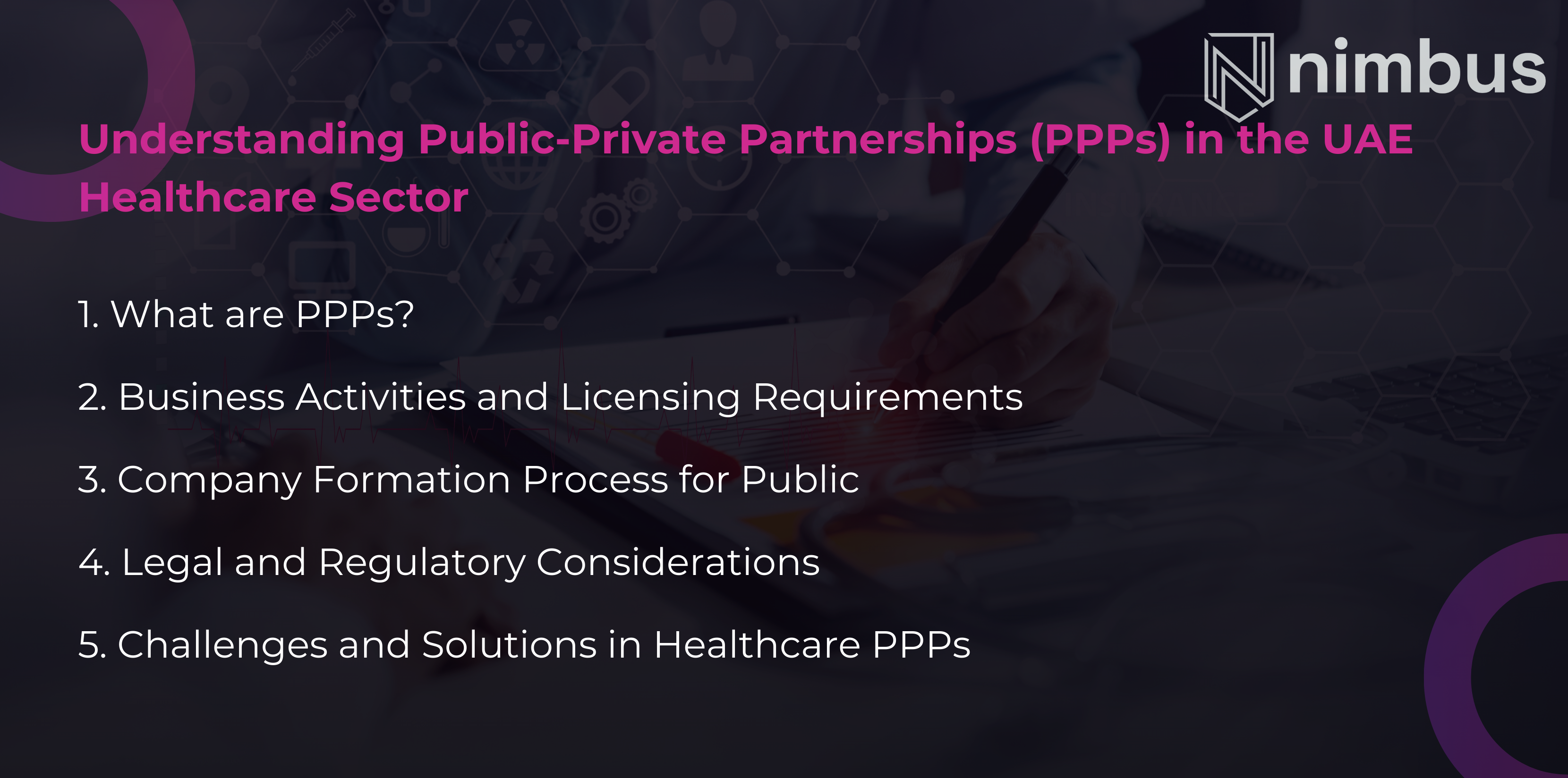The UAE healthcare sector is experiencing a major transformation, with Public-Private Partnerships (PPPs) playing a key role in this. The government is encouraging collaboration between public entities and private investors to improve its medical services and service infrastructure.
With the UAE’s medical tourism market projected to grow at a CAGR of 8.70% from 2024 to 2033, reaching an estimated USD 2,300 million, there are increasing opportunities for businesses looking to establish a presence in the healthcare sector through PPPs.
For investors and companies seeking business expansion in the UAE healthcare market, understanding the process of setting up a PPP is crucial. This post gives an overview of the legal framework, licensing requirements, and other major considerations for forming a healthcare PPP in the UAE.
Understanding Public-Private Partnerships (PPPs) in the UAE Healthcare Sector

1. What are PPPs?
Public-Private Partnerships are strategic agreements between government bodies and private sector companies aimed at improving healthcare services while optimizing costs and distributing risks. These partnerships align with the UAE’s broader vision of becoming a global healthcare hub and contribute to the development of world-class medical facilities.
– Key benefits of healthcare PPPs:
- Enhancing the quality of healthcare services
- Reducing the financial burden on the government
- Encouraging innovation in medical treatments and technology
- Expanding access to healthcare for residents and medical tourists
At the federal level, PPPs in the UAE are regulated by Federal Law No. 12 of 2023, which outlines the roles, responsibilities, and procedures for forming and managing these partnerships.
– High-potential healthcare sectors for PPP investment:
- Hospitals and specialized clinics
- Advanced diagnostic and imaging centers
- Oncology and rehabilitation facilities
- Medical research and development institutions
- AI-driven healthcare technologies and telemedicine
2. Business Activities and Licensing Requirements
Businesses operating under a healthcare PPP in the UAE must adhere to strict licensing and regulatory requirements. Permitted activities under healthcare PPPs include:
- Management and operation of hospitals and clinics
- Specialized healthcare services, including cardiology, oncology, and neurology
- Implementation of advanced healthcare technologies like AI diagnostics and telemedicine
- Medical education and training programs
– Licensing categories and requirements:
Healthcare businesses must obtain licenses from relevant authorities, depending on their location and type of service.
- Dubai Health Authority (DHA) regulates all healthcare facilities operating within Dubai, including free zones and special development zones.
- Ministry of Health and Prevention (MOHAP) provides nationwide regulatory oversight for medical projects.
- Department of Health (DOH) Abu Dhabi oversees healthcare initiatives and investments in Abu Dhabi.
– Regulatory updates in 2024:
- As of September 2024, Executive Council Resolution No. (49) of 2024 mandates that healthcare facilities and professionals operating in Dubai must hold valid permits issued by DHA.
- Healthcare facility licenses are issued for a renewable period of one year, subject to DHA’s compliance regulations.
3. Company Formation Process for Public-Private Partnerships
Setting up a healthcare PPP in the UAE involves several steps, from choosing the appropriate legal structure to obtaining regulatory approvals.
– Selecting the right business structure:
- Limited Liability Company (LLC) – Suitable for healthcare infrastructure projects. In some cases, a local UAE partner (government entity) may be required.
- Joint Venture (JV) – Recommended for PPPs, as it allows private companies to collaborate directly with government bodies while maintaining operational flexibility.
- Joint Venture (JV) – Recommended for PPPs, as it allows private companies to collaborate directly with government bodies while maintaining operational flexibility.
– Steps to register a healthcare PPP in the UAE:
- Register the business with the Department of Economic Development (DED) (for mainland operations) or the relevant free zone authority.
- Obtain approvals and operating licenses from DHA, MOHAP, or DOH, depending on the location and scope of services.
- Secure a formal partnership agreement with the government entity involved in the PPP.
4. Legal and Regulatory Considerations
– Legal aspects to consider when forming a healthcare PPP:
- Compliance with healthcare regulations – Businesses must meet stringent standards for licensing, facility management, and professional staffing.
- Foreign ownership rules – Certain healthcare activities allow up to 100% foreign ownership, especially in free zones.
- Data protection laws – Companies must adhere to UAE healthcare data protection regulations and, where applicable, GDPR compliance.
- Contractual frameworks for PPPs – Agreements must include clear risk-sharing mechanisms, performance benchmarks, and exit strategies to protect both parties’ interests.
5. Challenges and Solutions in Healthcare PPPs
Despite the many advantages of PPPs in the healthcare sector, businesses may encounter certain challenges when entering the UAE market.
– Common challenges:
- Complex approval processes – Regulatory requirements can be intricate, requiring businesses to navigate multiple government agencies.
- Balancing public and private sector objectives – Ensuring that private sector goals align with government healthcare initiatives is crucial.
- Recruitment of skilled professionals – Recruiting and retaining top healthcare talent is a key factor in operational success.
– Feasible solutions:
- Work with experienced consultants – Partnering with UAE-based business setup consultants can streamline the registration and licensing process.
- Leverage government incentives – The UAE offers various incentives, including funding support from entities like the Emirates Development Bank (EDB), to encourage PPP investments.
Public-Private Partnerships are shaping the future of the UAE healthcare sector, offering significant opportunities for private investors and companies to collaborate with government entities.
By understanding the legal framework, selecting the right business structure, and adhering to regulatory requirements, businesses can successfully establish and operate healthcare PPPs in the UAE.
With the nation’s strong commitment to healthcare innovation and medical tourism growth, companies entering this market stand to benefit from a dynamic and rapidly expanding industry.



